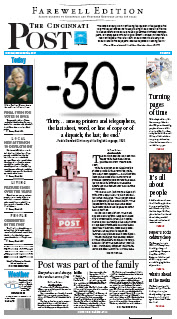Kentucky Post
|
|
|

"Farewell Edition" (last issue) of the Post
|
|
| Type | Defunct |
|---|---|
| Format | Berliner |
| Owner(s) | Scripps-Howard Newspapers |
| Editor | Mike Philipps |
| Staff writers | 52 |
| Founded | January 3, 1881 |
| Language | English |
| Ceased publication | December 31, 2007 |
| Headquarters | 125 E. Court St. Cincinnati, Ohio 45202 United States |
| City | Cincinnati, Ohio |
| Country | United States |
| Circulation | 25,000 (as of 2007) |
| OCLC number | 51645668 |
| Website | The Cincinnati Post at the Wayback Machine (archived October 22, 2007) |
The Cincinnati Post was an afternoon daily newspaper published in Cincinnati, Ohio, United States. In Northern Kentucky, it was bundled inside a local edition called The Kentucky Post. The Post was a founding publication and onetime flagship of Scripps-Howard Newspapers, a division of the E. W. Scripps Company. For much of its history, the Post was the most widely read paper in the Cincinnati market. Its readership was concentrated on the West Side of Cincinnati, as well as in Northern Kentucky, where it was considered the newspaper of record.
The Post began publishing in 1881 and launched its Northern Kentucky edition in 1890. It acquired The Cincinnati Times-Star in 1958. The Post ceased publication at the end of 2007, after 30 years in a joint operating agreement with The Cincinnati Enquirer.
The Post was known throughout its history for investigative journalism and focus on local coverage, characteristics common to Scripps papers. As one of the first successful penny presses outside the East Coast, the Post was written primarily for blue collar laborers who had no time to read a newspaper in the morning. Its articles were written to be easily readable. In its heyday, the paper consistently championed good governance and labor rights.
Though the Post considered itself politically independent, it historically tended to support progressive politicians relative to the Times-Star and Enquirer. The Post's editorial position became uniformly conservative in the years following its merger with the Times-Star, according to Stevens (1969). By the early 1990s, the paper's political stance had become "a grumpily conservative sigh of resentment" according to journalist William Greider.
...
Wikipedia
